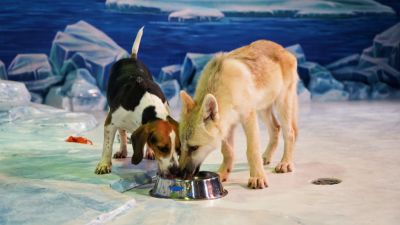Beagle gives birth to world's first cloned Arctic wolf

Maya the Arctic wolf is a completely normal puppy, aside from the fact she was cloned in a Beijing lab and born to a surrogate Beagle mother.
The scientific first was conducted by Sinogene, a Chinese biotechnological company that specialises in cloning pets.
Created using the same technique that was first pioneered in the UK back in 1996 when scientists cloned Dolly the sheep, she was derived from a skin cell of her real, genetic mother.
It is thought her creation could pave the way to helping save endangered species around the world.
Scientists had taken skin cells from a 16-year-old female wolf living in north-east China, before inserting them into an egg from the beagle, which had been stripped of its contents.
The donor cells and egg then fused to form an embryo before it was transplanted back into the surrogate.
Maya was born back in June, but researchers wanted to ensure she was healthy before unveiling her to the world.
Unlike a normal wolf, Maya is genetically identical to the wolf from which the skin cells were taken.
Speaking at a press conference in Beijing, Sinogene general manager, Mi Jidong said: "To save the endangered animal, we started the research cooperation with Harbin Polarland on cloning the arctic wolf in 2020.
"After two years of painstaking efforts, the arctic wolf was cloned successfully. It is the first case of its kind in the world."
Some scientists have however questioned the ethical nature and the effects cloning would have on biodiversity. It is understood that the successful birth came after the creation of 137 embryos, 85 of which were they transferred into seven different beagles.
An issue that has been acknowledged by the Chinese scientists is that due to being raised alongside a beagle, Maya would not learn the requisite skills to be a successful wolf.
Want a quick and expert briefing on the biggest news stories? Listen to our latest podcasts to find out What You Need To Know.